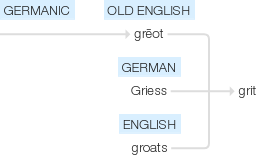Grit
Old English grēot ‘sand, gravel’, of Germanic origin; related to German Griess, also to groats.
wiktionary
With early modern vowel shortening, from Middle English grete, griet, from Old English grēot, from Proto-Germanic *greutą (compare German Grieß, Swedish gryta, Norwegian Nynorsk grjot), from Proto-Indo-European *gʰr-eu-d- (compare Lithuanian grúodas(“frost; frozen street dirt”), Serbo-Croatian grȕda(“lump”)).
From Middle English gryt(“bran, chaff”), from Old English grytt, from Proto-Germanic *grutją(“coarsely ground bits”) (compare Dutch grut, German Grütze), ablaut variant of Proto-Indo-European *gʰr-eu-d-. See above.
etymonline
grit (n.)
Old English greot "sand, dust, earth, gravel," from Proto-Germanic *greutan "tiny particles of crushed rock" (source also of Old Saxon griot, Old Frisian gret, Old Norse grjot "rock, stone," German Grieß "grit, sand"), from PIE *ghreu- "rub, grind" (source also of Lithuanian grūdas "corn, kernel," Old Church Slavonic gruda "clod"). Sense of "pluck, spirit, firmness of mind" first recorded American English, 1808.
If he hadn't a had the clear grit in him, and showed teeth and claws, they'd a nullified him so, you wouldn't have see'd a grease spot of him no more. [Thomas Chandler Haliburton, "Sam Slick in England," 1843]
grit (v.)
"make a grating sound," 1762, probably from grit (n.). Meaning "to grate, grind" is from 1797. Related: Gritted; gritting.
